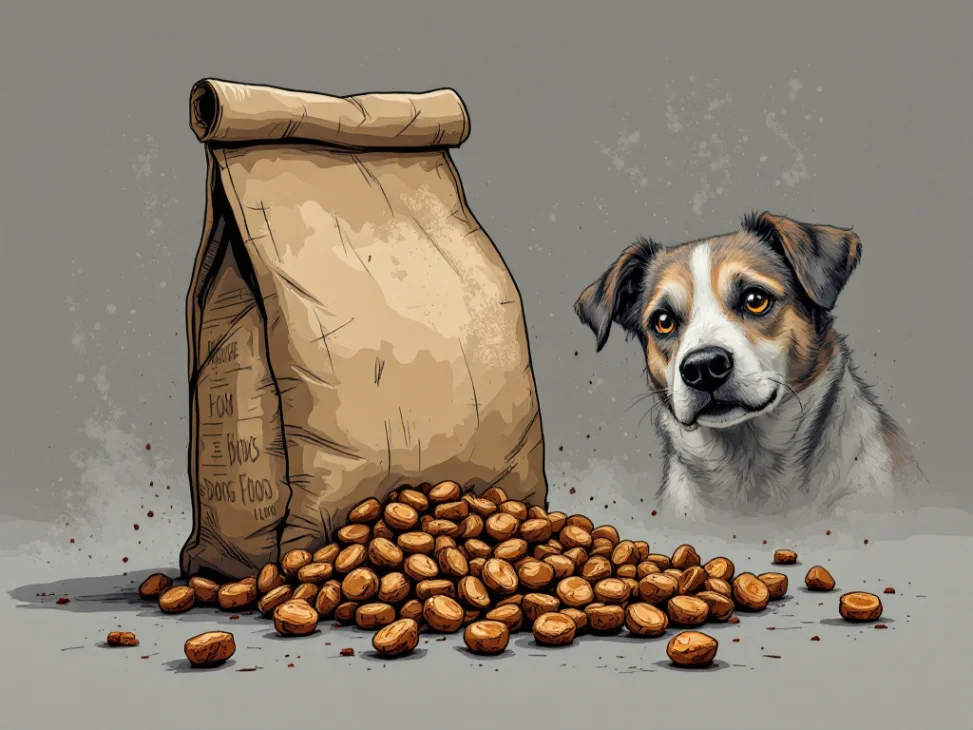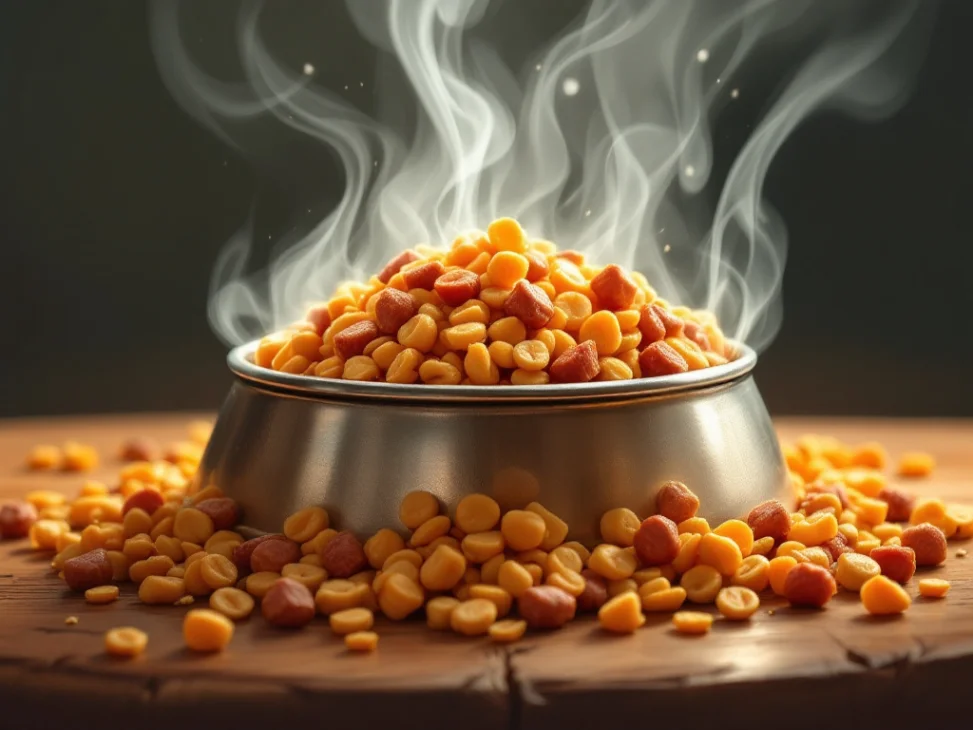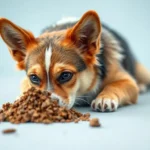
Introduction
Dog nutrition plays a vital role in ensuring the overall health and well-being of our furry companions. Just like humans, dogs require a balanced diet that provides the essential nutrients they need to thrive. However, one question that often arises among dog owners is: why does dog food smell bad? Is it typical? This article aims to delve into the reasons behind the odors associated with various types of dog food and whether these smells are commonplace or cause for concern.
Understanding Dog Food Composition
Types of Dog Food
Dog food comes in several forms, each with its unique characteristics and intended benefits:
- Dry Kibble: This is the most common type of dog food, known for its convenience and long shelf life.
- Wet/Canned Food: Often more palatable to dogs, wet food contains higher moisture content.
- Raw Diets: These diets consist of uncooked ingredients, often including raw meat, bones, and vegetables.
- Homemade Diets: Some pet owners opt to prepare their dog’s meals from scratch, ensuring quality control over ingredients.
Common Ingredients in Dog Food
Understanding the composition of dog food can help explain its smell. Here are some common ingredients:
- Protein Sources: This includes meats like chicken, beef, fish, and plant-based proteins such as lentils.
- Carbohydrates: Ingredients like grains (rice, oats) and vegetables (potatoes, peas) serve as energy sources.
- Fats and Oils: Healthy fats are crucial for skin and coat health.
- Additives and Preservatives: These are used to enhance flavor and prolong shelf life but can contribute to odors.
The Role of Each Ingredient in a Dog’s Diet
Each ingredient plays a significant role in a dog’s diet, offering various nutritional benefits. However, certain protein sources, such as fish or organ meats, can produce stronger odors. Additionally, the freshness of ingredients can impact the overall smell of the food, with fresher ingredients typically emitting less odor.
Why Dog Food Smells

Natural Odor Sources
Some ingredients in dog food are naturally aromatic:
- Fish: Known for its strong smell, fish can leave a lingering odor, especially in wet food.
- Certain Meats: Organ meats, such as liver, can have a robust scent that some dog owners find off-putting.
- Fermentation Processes: Wet dog food can undergo fermentation, especially if stored improperly, leading to pungent odors.
Chemical Reactions
Over time, the breakdown of fats and proteins can create unpleasant smells:
- Breakdown of Proteins: As proteins break down, they can emit sulfur compounds that smell foul.
- Storage Conditions: Humidity and temperature can accelerate spoilage. Foods stored in warm, damp conditions are more likely to develop strong odors.
Signs of Spoilage
It’s essential to distinguish between natural odors and those indicating spoilage:
- Changes in Smell: A sudden increase in odor strength can signal that the food is going bad.
- Visual Cues: Mold, color changes, or an unusual texture are clear indicators that the food has spoiled.
Is It Typical for Dog Food to Smell Bad?
Normal vs. Unpleasant Odors
Understanding what constitutes a “normal” smell can help dog owners determine if their dog’s food is safe:
- Typical Smells: Dry kibble usually has a mild scent, while wet food may have a stronger smell due to its ingredients.
- Foul Odors: A rancid or sour smell is not typical and can indicate that the food is spoiled.
Factors Influencing Odor
Several factors can influence the smell of dog food:
- Quality of Ingredients: High-quality, fresh ingredients tend to emit less odor than lower-quality alternatives.
- Brand Differences: Different brands may use varying formulas and preservatives, leading to distinct smells.
- Storage and Handling Practices: Proper storage is critical. Keeping dog food in a cool, dry place can help maintain its freshness and minimize odors.
Addressing Concerns About Dog Food Smells
When to Be Concerned
Knowing when to be concerned about your dog’s food smell is crucial for ensuring their health:
- Signs of Spoilage: If the food smells rancid, sour, or otherwise off, it’s best to discard it.
- Health Risks: Feeding spoiled food can lead to gastrointestinal issues or more severe health problems in dogs.
Solutions for Strong-Smelling Dog Food
If you’re dealing with particularly strong-smelling dog food, consider these solutions:
- Proper Storage: Seal food in airtight containers and store it in a cool, dry place to minimize odors.
- Brand Recommendations: Research and choose brands known for less odor, often those that use higher quality ingredients.
Consult a Veterinarian
If you’re uncertain about the smell of your dog’s food or have specific concerns:
- Professional Advice: A veterinarian can provide insight into whether the food is appropriate for your dog’s dietary needs.
- When to Consult a Vet: If your dog shows signs of distress or refuses to eat their food, seek veterinary guidance.
Improving Your Dog’s Diet
Choosing High-Quality Dog Food
Selecting high-quality dog food is vital for your pet’s health:
- Ingredient Sourcing: Look for brands that prioritize fresh, high-quality ingredients and avoid fillers.
- Reading Labels: Understanding how to read dog food labels can help you make informed choices. Look for recognizable ingredients and avoid those with excessive additives.
Transitioning to Better Options
Switching your dog’s food can be beneficial, but it should be done gradually:
- Gradual Transition: Mix the new food with the old over several days to allow your dog’s digestive system to adjust.
- Monitoring Reactions: Keep an eye on your dog’s behavior and health during the transition. Changes in smell or refusal to eat can indicate issues with the new food.
Homemade Diets and Their Benefits
Preparing homemade dog food may reduce odors and ensure quality:
- Overview of Homemade Options: You can control the ingredients you use, potentially leading to fresher meals.
- Nutritional Considerations: Ensure that homemade diets are balanced and meet your dog’s nutritional needs. Consult a vet or pet nutritionist for guidance.
Frequently Asked Questions (FAQs)
Why does my dog’s food smell different than before?
A change in smell can indicate a few things—perhaps the food has gone stale or spoiled, or the manufacturer has changed the recipe. Always check the expiration date and inspect for any signs of spoilage.
Can dog food smell indicate health issues?
While most odors are harmless, persistent foul smells from your dog’s food may signal spoilage, which can lead to health problems if consumed. If your dog exhibits gastrointestinal distress, consult a veterinarian.
Are certain dog breeds more sensitive to food smells?
Certain breeds may have heightened olfactory senses, making them more sensitive to food odors. However, individual preferences can vary widely regardless of breed.
What should I do if my dog refuses to eat smelly food?
If your dog refuses to eat food due to its smell, it may be best to switch to a different brand or formula. Ensuring the food is fresh and meets your dog’s dietary needs is essential.
Conclusion
In conclusion, understanding the reasons behind dog food odors can help pet owners make informed decisions about their dog’s nutrition. While some smells are normal, others may indicate spoilage and should not be ignored. Always prioritize high-quality ingredients and proper storage practices to ensure your dog receives the best nutrition possible. If concerns about odor persist, consulting a veterinarian is always a wise choice for your pet’s health and well-being.









